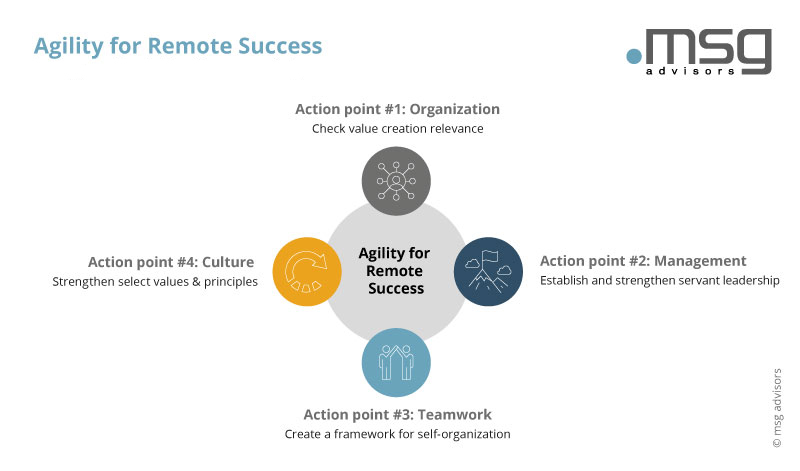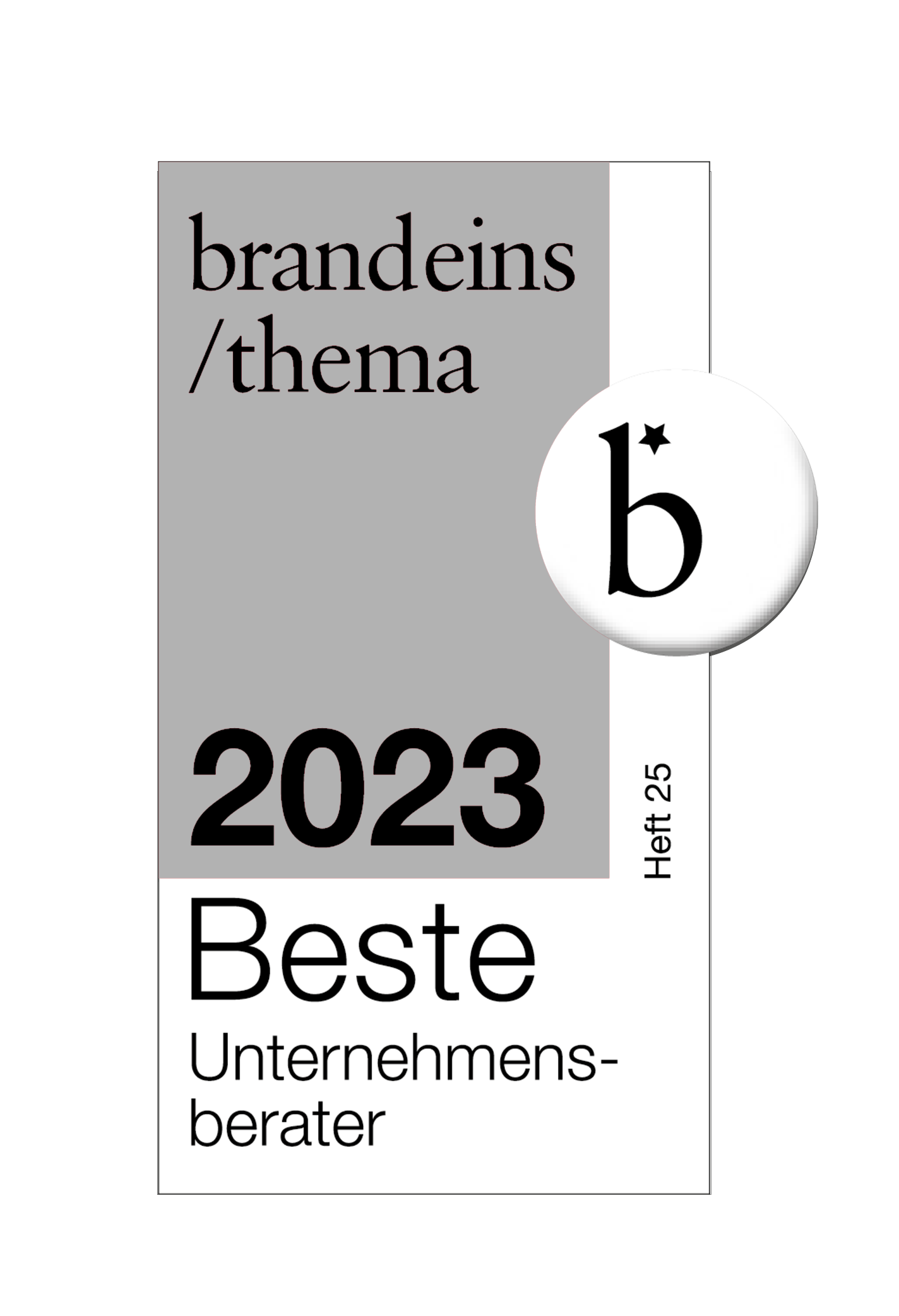Agility for Remote Success:
How agile organizational principles
can help companies during the Corona crisis.
The Corona pandemic is a unique SWOT test for organizations: the complexity and dynamics of the crisis rapidly bring the strengths and weaknesses of collaborations to light – whether in communication, planning day-to-day activities or when it comes to (self) motivation. The skills, structures or technologies that are lacking become apparent, especially when switching to remote working or home office structures – or, on the contrary, they may quickly ensure employees’ ability to work.
Companies that already have gained some experience with agile work methods have an enormous advantage in this situation. After all, the skills and characteristics of agile organizations are not only extremely beneficial during a crisis in general, but more specifically, for successful remote work.
With msg advisor’s “Agility for Remote Success” approaches, it is precisely these skills that companies employ. Two goals are important to us within this context: first, to activate and use the strengths of agile organizations to master the crisis situation in the short term. Second, to ensure the transformation to an agile organization does not stop or is not undone, but instead, to drive it forward as part of the new remote working situation.
Action point #1: Organization
Agile organizations consistently focus on value creation and align themselves accordingly; they create structures that are in line with their products and services. Companies have been working to rid themselves of functional silos for a while now, replacing them with end-to-end units that are able to react quickly and flexibly. In doing so, having a strong shared vision is what holds units that are as self-organized as possible together. Decisions are made as close to operational events as possible in order to leave tedious, hierarchy-oriented structures behind.
Companies can now do what has been part of day-to-day business in agile and lean structures for a while: prioritize what is important to the customer. A value creation-oriented alignment based on products and services can help with central organizational decisions. Flexibility and speed are helpful, especially during a crisis, for e.g., meeting previously unknown customer requirements or creatively replacing interrupted logistics chains. One thing is clear when doing so: the structural and process organization, as well as the structures themselves cannot simply be changed “remotely”.
The following questions are based on our experience with transformation projects and can help:
- How can I strengthen customer orientation, creativity and proactivity within my product and service teams in order to come out of the crisis even stronger?
- Which central functions can I downsize or eliminate as a cost-savings measure, without it having a significant impact on my value creation?
- Which decision-making processes get in the way of fast decisions “for customers”? Can I change them without exposing myself to greater business risks?
- Which hierarchy levels can be eliminated or are even obstructive?
Action point #2: Management
The leadership principle of “Servant Leadership” has become a key success factor within the context of agile transformation. The management team in an agile organization is less of a decision maker, manager or leader. Instead, they act as a “servant leader” and facilitator to create a safe space for the team, allowing the team to work and make decisions in a self-organized, efficient and result-oriented manner. They have the team’s back and eliminate any hurdles to ensure the team can work as planned. The transparency this requires when it comes to work progress and work methods is provided by the team itself through practices such as stand-ups, sprint reviews and retrospectives.
The “servant leader” approach has become a necessity in the current crisis. Management cannot ensure employee productivity through control anymore, as such has become impossible with the remote work situation. Thus, they should instead focus on ensuring the individual and the team still see the company as their shared “home”, even if working distributed and alone. This includes instilling a feeling of working together, even in a crisis, and having a shared vision.
In these times, management should quickly obtain a clear overview of the team’s most urgent needs (technical connection, workflow/task transparency, motivation, etc.) and actively assist with the establishment of solutions and interfaces to other teams. Success-critical questions when doing so include:
- What does the team need in order to keep being productive and work for the customer and in accordance with the company vision / image?
- Which hurdles do I need to eliminate most urgently?
- How can I provide adequate information, finances, resources, networks, support, etc. in order to help the team?
- In what areas of remote working are my participation and control unnecessary or even obstructive compared to how we used to work?
- Where is it actually needed and how urgently?
- Which of my talents and experiences can I use to sincerely exercise and improve my new management tasks?
Action point #3: Teamwork
It is not only the management style, but the ability to work as a team and organize as a team that plays a decisive role within the framework of agile transformation. What has proven effective is allowing teams to organize themselves and to transition to the pull principle, in order to enable efficient and result-oriented work. Instead of waiting for work to be assigned by a superior, teams are encouraged to coordinate and prioritize tasks themselves. Essential to this approach are transparency and sound communication of the shared goals and tasks.
A cross-functional team organization means agile units do not always work at the same location. Tools such as digital Kanban boards, daily stand-up meetings, regular reviews and retrospectives make it easier for teams to synchronize their work and exchange know-how; hurdles can be identified more quickly; results are visible to everyone; and the next steps can be easily organized.
The principle of agile self-organization is an important solution approach in the current crisis and helps manage the limitations working alone from a home office can present.
Teams should create a structure for self-organized teamwork: clear, short-term goals in sprints with defined roles and artifacts (same timing, even structure through deadlines) form a key starting point. As to the “how” of achieving goals, employees can decide themselves. Key initial questions here are:
- Who makes sure that the roles and tasks assigned to each team member are clear or have been redefined in order to enable effective work?
- Which meetings make sense to ensure well-organized teamwork? Which participants are actually necessary for each meeting?
- Who is in charge of maintaining an overview of workloads and capacities throughout the team?
- Which technology / online meeting platform will be consistently used for work? Who ensures they are easy to operate and function smoothly?
Action point #4: Culture
The mindset and culture of the organization play a key role during agile transformation. In this case, the agile manifest defines, for example, clear principles such as “reacting to changes more than following a plan” or “placing individuals and interactions over processes and tools".
The concept of self-organized teams requires a culture of trust and that culture must be developed and promoted. To do so, transparency must be created and collaborations promoted. This helps increase self-motivation in colleagues and create further synergies. In addition to trust in employees, for example through decision-making authority and extensive implementation freedom, each individual must also assume responsibility and have the corresponding awareness.
The recent increase in remote working structures has a significant impact on the cultural dimension of teamwork. Social interactions like the company grapevine, the communication that takes place during coffee breaks, team sports and team rituals can fall to the wayside as a result. Focusing on the following three points when developing agile values and principles has proven effective in mastering these challenges:
- Trust and responsibility in the context of teamwork
- Customer orientation
- Flexibility and creativity
With that in mind, the key questions to be addressed first when consciously changing the existing culture are:
- What values & principles do we agree on as a team?
- How can employees assume responsibility in a way that allows them to help manage the crisis?
- What does respectful and attentive listening during meetings facilitate and promote?
- How are errors handled?
- How is a more efficient handling of the resource “time” ensured? This could involve a number of points, such as time management in home office or allowing everyone the chance to speak during an online meeting.
Find out more.

Michael Dusch
We are looking forward to hearing from you!
Further topics
-

Minimum Viable Organization
Developing hot spots of the digital organization in a targeted manner.
- 1
-

Remote Project Management
Strengthen resilience in critical phases with Project Management Factory.
- 1
- 1






